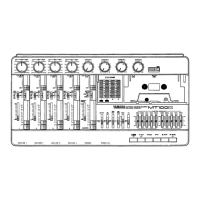CONGRATULATIONS!
Your MT100II Multitrack Cassette Recorder is a powerful recording tool that will enable you to
work with sound in many ways. No other multitrack cassette recorder offers the straightforward
simplicity and ease-of-use
of
the MT100II. Whether you need to record acoustic instruments or
voice using microphones, electronic instruments and line-level sources, or a creative blend
of the
two, the MT100II makes the process
of
building tracks extraordinarily smooth and simple. You can
simply record and remix four tracks, or use the multitrack “ping-pong” recording technique to in-
dividually record up to ten independent parts – adding sound layer by layer until you create
exactly the arrangement and texture your imagination demands with its ability to record on all four
tracks at once, or in any conbination, MT100II is the ideal choice
for
recording bands or layering
tracks at home. And, because it’s a YAMAHA, you know that the MT100II will give you the very
finest sound quality and overall performance available.
In order to make use
of
the MT100II's many features and obtain maximum performance, we urge
you to read this operation manual thoroughly –
and keep it in a safe place
for
later reference.
CONTENTS
PRECAUTIONS
.........................................
1
THE CONTROLS AND CONNECTORS
.....................
2
MT100II CONTROLS AND THEIR FUNCTIONS
.................
2
CONNECTION EXAMPLES...........................
8
ABOUT CASSETTE TAPES
...............................
9
THE RECORDING PROCESS
...........................
10
RECORDING THE FIRST TRACK
........................
11
STEP 1: CHANNEL-TO-TRACK ASSIGNMENT
................
11
STEP 2: MONITOR SETUP
..................................
12
STEP 3: SETTING RECORDING LEVELS
.....................
13
STEP 4: RECORD
.........................................
13
OVERDUBBING
.......................................
14
PING-PONG RECORDING...............................
15
A PING-PONG RECORDING EXAMPLE
......................
16
MIXDOWN............................................
17
USING THE GRAPHIC EQUALIZER
......................
18
USING THE TAPE OUT JACKS
.........................
19
USING THE AUX SEND/RETURN LOOP
..................
20
PUNCH-IN/OUT RECORDING
...........................
21
MAINTENANCE
.......................................
22
SPECIFICATIONS
......................................
23
BLOCK DIAGRAM
.....................................
25

